Photo: Eric Rojas
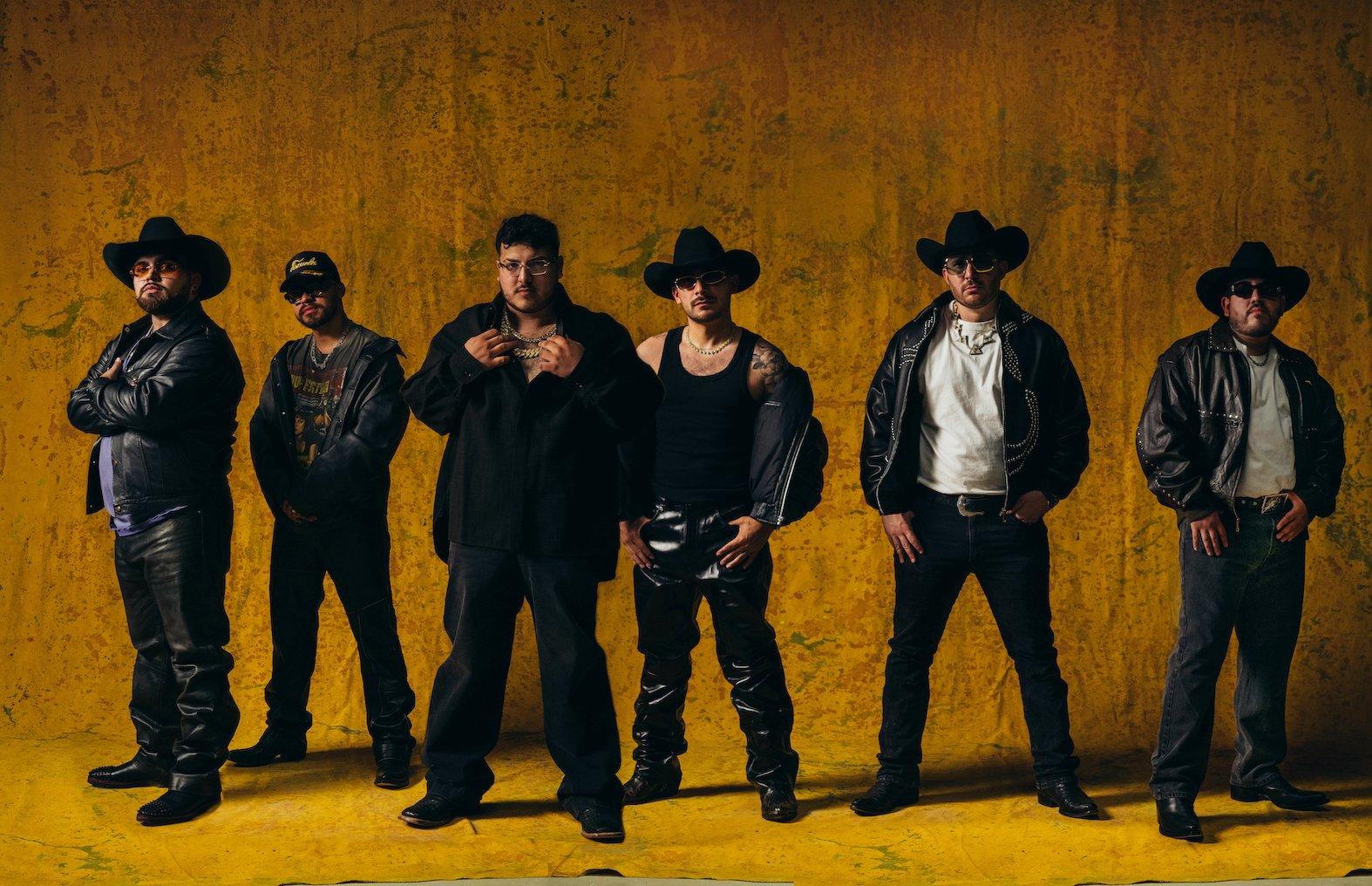
interview
Grupo Frontera On 'Jugando A Que No Pasa Nada' & Fully Expressing Themselves: "This Album Was Made From The Heart"
With their second album, regional Mexican music stars Grupo Frontera aim to honor their roots while showing their wide-spanning musical interests. Hear from some of the group on the creation of the album and why it's so special to them.
In just two years, Grupo Frontera have gone from playing weddings in their native Texas to joining Bad Bunny on stage at Coachella and performing on "The Tonight Show Starring Jimmy Fallon." No matter how rapid their rise to fame has become, the Texas sextet has held the same ethos: celebrating their Mexican heritage while embracing the American culture they were born into.
Embracing that balance has helped them transcend cultural barriers with their modern take on regional Mexican music, which incorporates a wide range of musical styles. That holds true on Grupo Frontera's second album, Jugando A Que No Pasa Nada, out now.
With bright accordion lines and a high-energy blend of urbano party anthems, cumbia-inspired ballads, and forays into pop, the album is a masterful display of the group's mixed cultural background. It retains the same Latin cowboy spirit of their first LP, 2023's El Comienzo — which had roots in the norteño genre, a traditional style originated in Northern Mexico — while tapping into the music they grew up listening to in the States, like hip-hop, corridos tumbados, and country music.
While El Comienzo introduced Grupo Frontera as loyal traditionalists, Jugando A Que No Pasa Nada aims at speaking to younger generations. It's a fitting approach for the group, whose ages range from early twenties to early thirties across its six members — Alberto "Beto" Acosta, Juan Javier Cantú, Carlos Guerrero, Julian Peña Jr., Adelaido "Payo" Solis III, and Carlos Zamora — that also speaks to their evolution amid their whirlwind success. It's proof that they aren't afraid to create music that is completely true to them — and that's exactly what makes Jugando A Que No Pasa Nada special.
Below, Cantu, Guerrero, Peña, and Solis speak with GRAMMY.com about their cultural roots in South Texas and the making of Jugando A Que No Pasa Nada.
The last two years were a very prolific time for Grupo Frontera. What was it like to create Jugando A Que No Pasa Nada after everything that's happened to the group?
Adelaido "Payo" Solis: Last year we were working a lot, playing four or five concerts a week, and that didn't give us time to structure El Comienzo as well as we wanted to. Now we made time to record all these different types of songs. It was amazing to have time to work on the album cover and all the songs the way we wanted to, and have everything set in a certain way to represent the new album to its highest potential.
Between 2023 and this year, were you able to take any time off to work on this new record, or was it done in between touring?
Juan Javier Cantú: There were times when we were touring El Comienzo that we would record before the people got inside the theater. We would record onstage. We'd be like "Wait, don't let the people in — 20 more minutes, we have to finish this session!" That happened with our new songs "Quédate Bebé" and "Nunca La Olvidé."
Solis: It's a little bit of both because those were recorded live, but then two months ago, we locked ourselves in the house for a good four or five days, and out of that came, like, 15 more songs.
You mentioned that, for this new record, you had more time to work on the order of the songs. What's the general feeling behind this track list? Starting with "F—ing Amor."
Solis: The general feel of this album is literally the album's name, Jugando A Que No Pasa Nada [which loosely translates to "pretending everything is OK"]. Since we had more time to think about it, we tied many things to that name, to that phrase.
Everyone, at some point, has pretended everything is OK when in reality, it's not. You can see it in the album cover — the truck is on fire, but our character, who represents Grupo Frontera, is sitting in the car as if nothing is wrong. So the idea — and I know everyone experienced this — is that when you get in your truck, you can play our record and you can drop the act. You can stop pretending everything is alright. You can get in your feelings.
So the way it's structured, starting with "F—king Amor," is that you don't want to know anything about love, then in the middle, you have "Ya Pedo Quién Sabe," which says "maybe I miss you," and then by the end, "Quédate Bebe" [which translates to "Stay Baby"]. So it is a ride, an experience, which starts with you being hurt, or left behind by someone, and you being sad about it, then slowly wondering how is she doing, then saying "I miss you," and finally "stay with me."
Cantú: More than anything, we are playing with genres. In this record, you have our traditional cumbias, country music, and then songs like "Desquite." So that was also the goal, for people to know more about our music and the music we like.
Solis: Each member of Grupo Frontera listens and plays different styles, so starting from that, we each had a big say in the genres we wanted to play and styles we wanted to record on this album.
More than anything, we were thinking of new generations. The Latinos of newer generations that don't speak Spanish, or don't get to come back often to Mexico or the countries where their parents are from. They don't want to hear just cumbia, so in our album, we want to make all these styles for them to find, in our songs, the genres that they like.
You mentioned that each of you has different styles and genres you brought to the new record. How did you work in the studio to generate these new sounds?
Solis: Grupo Frontera doesn't really use a lot of computer sounds, most of the music we play is through our instruments. We used to work on our songs starting from guitar and voice only, but now because we had more time to work on things, we each took a song and would listen to it for days. Then we'd meet again as a group and work on it in the studio: everyone's opinion counts, and no one's opinion takes precedence over the other. That's how, slowly, each new song took shape.
When you talked about the moment in which you get in your car or truck, and finally get to stop pretending everything is alright — does that car culture come from your upbringing in Texas?
Julián Peña: That culture is definitely from where we are from, from the Valley [the Lower Rio Grande Valley, which spans the border of Texas and Mexico], where there are a lot of troquitas tumbadas [lowered or customized pickup trucks]. You'd hear la Raza zooming by, blasting our songs, with the bass booming, from their trucks. So it's kind of like a relief, your safe space.
Like the album's title says, "pretending everything is fine"... you're pretending to be fine and then once you get in your car and you pass yourself the aux, you turn that up and you start bawling, or feeling whatever you're feeling. Then the album's over, gotta get back to work, clock back in, and go back to pretending everything's fine. It's like an escape that we know many people have, it has happened to all of us; you go on a drive to decompress, turn the music up, let it all out, and feel better. That's what we wanted to capture with that image.
What songs did you each play when you needed that kind of moment?
Cantú: When I broke up with a girlfriend, around 2012, my go-to was Drake.
Peña: Mine was "Then," by Brad Paisley. I was just sad and going through a country phase. [Laughs.]
Solis: I would listen a lot to a song by Eslabón Armado called "Atrapado."
Cantú: When I feel a little trapped by this street lifestyle I go, "I Should've Been A Cowboy"! [All laugh.]
I read some of you grew up raising cattle, or come from families of farmers and ranchers. What aspects of that lifestyle do you miss, in contrast with being in a city like LA, and actively involved in the music industry?
Solis: Juan had his ranch around General Bravo [a municipality in Mexico], and I was born in the States, but I would go every weekend to Mexico, to my parent's ranch, where they had cattle. I know Juan can relate to this — when you are at the ranch and play a song, and can sing out loud without anyone around listening or judging you, that's a really nice feeling. When you are on stage, in the industry, you're not singing only to yourself, but to make the audience's day better. So no matter what you're going through, when you're on stage, your job is to make people happy.
Cantú: Going to a place — like a ranch, an open space — to disconnect, it's like a reset. I feel a lot of people have not experienced that, they don't know the power that has.
Through your lyrics, you adapted old love songs and romance to modern times. Some songs even mention emojis, DMs and texting. Do you have any favorite emojis?
Solis: Oh man, I love the black heart emoji because it can mean many things. A dead heart, or that you're not feeling anything. It can mean your heart is broken and needs mending to go back to being red. I think it's super cool.
Carlos Guerrero: I like the thinking face emoji.
Cantú: Sometimes he uses it out of context and we don't know if he's thinking, or he's mad. [Laughs.] For me, the one I use the most is the "thanks" [praying hands emoji].
Peña: I like the heart hands emoji. Like "Hey what's up," and throw a heart hands emoji.
Going back to your music, what's your favorite part of making songs?
Solis: I'm not sure if we all have the same answer, but for me, my favorite part about being able to sing, record and write these songs is to sing them with all the feeling in the world. And that is amazing, to be able to let that out.
Cantú: The simple fact of creating something and getting to test it out, seeing people sing it, it's like, Wow, we made that.
Peña: Yeah, that you do something and then put that out there right and you're like, I wonder if this feeling is gonna get translated the way we want it to. And then, like Juan said, when people go to concerts, and sing it back to us, or we see people post stories of them singing it and going through it. It's like, we made that! We got that point across, and it feels good for all of us.
How do you navigate being an American band with a cross-cultural upbringing?
Cantú: It's really cool. We were lucky to go to Puerto Rico, Colombia and Argentina, to collaborate with artists like Arcángel, Maluma, Shakira, and Nicki Nicole. That helped us understand their culture and meditate on what it means to be Latino, not just Mexican. Latino identity entails so many cultures in one, and even Mexican identity is vast. Latinos are from everywhere.
How was it to collaborate with all these other artists, and open your group to collaborate with them in Jugando A Que No Pasa Nada?
Solis: Basically, we are like a group of brothers. We sometimes spend 24/7 together. We see each other every day, and we spend all our time together on the tour bus and at home, even when we don't need to see each other. So when we collaborate with other artists, like Morat, Maluma, or Nicky Nicole, they sense that vibe — we carry that with us. I feel that carries through, to the point where we can all have that vibe together.
When we are collaborating with other artists, it feels as if it was a friendship that has been around for a while. Like, have you ever felt or had that friendship where you can go like a month without seeing each other and when you see each other is like you had seen each other? That's basically how it is when we collab with other artists.
I know it's hard to pick a favorite song from the new album—
Solis: It's not that hard! My favorite is "F—ing Amor."
Why?
Solis: Because before Grupo Frontera started, that was more the style that I listened to. I got into the music of Natanael Cano, Iván Cornejo, and others. I grew up listening to old cumbia songs that my parents played for me, but in high school, I started listening to new stuff and new genres, so I think that's why my musical style is more versatile. So "F—ing Amor" is more Sierreño, has more bass, and the congas and percussion; the vibe of that song reminds me of how, in high school, I would drive my truck listening to Natanael Cano.
Peña: Mine is "Echándote De Menos." Ever since we recorded it, it has that rhythm in the middle where we all drop, on that note… I like all of them, but that one, in particular.
Cantú: I have to go with two. When I first listened to them, "Los Dos," our collaboration with Morat, and "Por Qué Será" with Maluma. That song, when they first showed it to me, I felt chills down my back.
Guerrero: Mine is "Los Dos," with Morat, because we liked Morat before being with Frontera.
Cantú: To make a song with them is an achievement for us because our big song ["No Se Va"] was a cover of theirs. So making a song together is pretty cool — not many people get to do that.
Solis: We had people tell us that we were stealing their song! We get that Morat is some people's favorite group but we were like, bro, it is our favorite too, that's why we did that song!
What is your dream for this new record?
Solis: We were talking about this yesterday in the van. We don't want to expect anything out of it — success, or big numbers — because this album was made from the heart. We are just so happy and proud to be releasing it into the world.
Guerrero: I just hope that people like it, because, as Payo says, we explored a lot of different genres, so we hope people dig that. We put our best into it.
Cantú: I want what Payo and Carlos said, but also, to go to Japan to play our songs.
Peña: I want what the three of them want, but for people to really connect and identify with the songs. Even if they connect with one or three, what I want for the album is that — to connect with people.
Meet The Gen Z Women Claiming Space In The Regional Mexican Music Movement
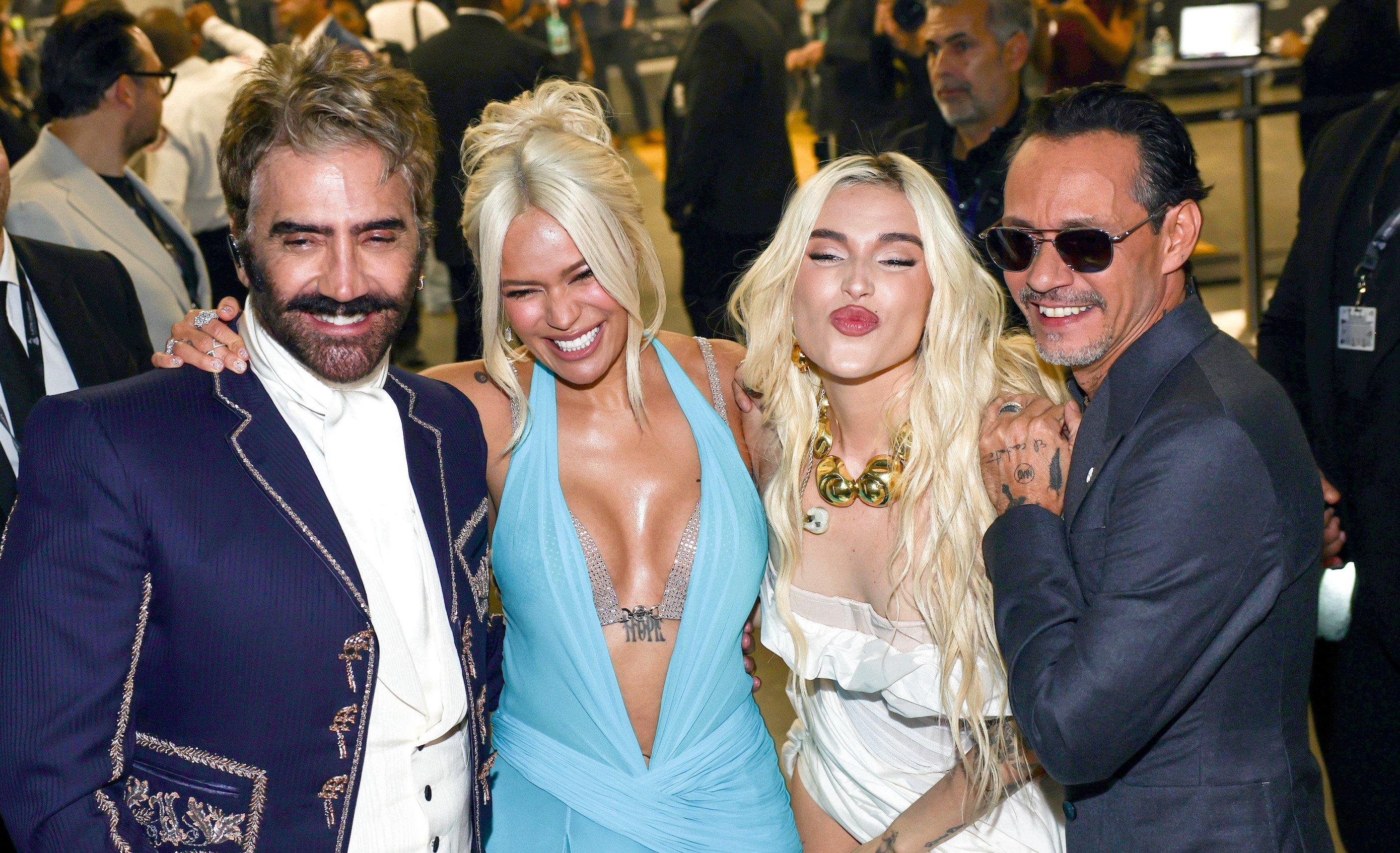
Photo: Getty Images for The Latin Recording Academy
list
10 Meaningful Moments From The 2024 Latin GRAMMYs: Karol G's Heartfelt Speech, Tributes To Late Legends & More
The 25th anniversary of the Latin GRAMMYs was a celebration indeed, spotlighting contemporary stars like Carín León and Anitta while paying homage to veterans like Carlos Vives and Juan Luis Guerra who have paved the way. Revisit 10 highlights here.
One would have expected plenty of pomp and circumstance as the Latin GRAMMYs celebrated their 25th year anniversary. But there were no lengthy speeches or self-congratulatory videos during the Nov. 14 telecast.
This year, the telecast focused on the things that matter: saluting the magic of undying genres like salsa, rock and bossa nova. Honoring the legacies of such Latin American trendsetters as Carlos Vives and Juan Luis Guerra. Giving artists a carefully curated space where to showcase their craft and inspiration.
From the stark cinematic moods of reggaetón to the healing warmth of Afro-Caribbean roots and the bold expansion of música mexicana, here are 10 of the most exciting celebratory moments from the 2024 Latin GRAMMYs.
The Music Of Carlos Vives Is A Priceless Cultural Treasure
Colombian singer/songwriter Carlos Vives was The Latin Recording Academy's 2024 Person Of The Year — a fitting recognition to his groundbreaking fusion of the accordion-heavy vallenato music of his land with rock, pop and even reggae. Vives' path of innovation began with the 1993 album Clásicos de la Provincia, and, like the Latin GRAMMYs, his career has evolved much over the last 25 years.
The singer kicked off the telecast with a career-spanning medley of hits such as "Fruta Fresca" — a rollicking gem off his 1999 classic El Amor de mi Tierra — and the more recent "La Bicicleta." At the end of his performance, he was joined by an enthusiastic group of fellow singers, including Juanes and Camilo. This brisk summary of his creative genius underscored his innate ability to connect with the essence of Latin American culture.
Read More: Watch: Carlos Vives Performs "La Bicicleta," "Robarte Un Beso" & More At The 2024 Latin GRAMMYs
The Moody Soundscapes Of Urbano Continue To Expand
Jagged regaetón beats and ominous trap atmospherics are a natural component of the Latin pop DNA. But the urbano universe continues to grow, experimenting with novel song structures while incorporating references to other genres.
Early on in the telecast, three contemporary stars joined forces for a segment that showcased the ever evolving side of urbano. Eladio Carrión ("Mama's Boy") Quevedo ("Columbia") and Myke Towers ("La Falda") combined their proven commercial appeal with a sophisticated vision.
A True Master Never Stops Learning His Craft
Let's just say that this year's ceremony was a memorable evening for perennial Latin GRAMMY favorite Juan Luis Guerra. The 67-year-old singer/songwriter won the coveted Record Of The Year and Album Of The Year awards, and cherished his Dominican roots in his acceptance speech.
But Guerra also let the music speak for itself in a mesmerizing performance of Record Of The Year winning track "MAMBO 23." A stunning display of craftsmanship, it begins with a dembow beat, incorporates electronic loops, and also switches between the haunting qualities of spiraling bachata lines and the raucous party vibe of traditional merengue — all within the same song. Clearly, Guerra continues to learn and further refine his musical lexicon with each new project.
Read More: Juan Luis Guerra Sweeps The 2024 Latin GRAMMYs With 'Radio Güira'
Three Mexican Legends Are Sorely Missed
Alejandro Fernández | Photo: Getty Images for The Latin Recording Academy
There was a reflective quality to this year's telecast, which included tributes to classic genres and luminaries of the past. Perhaps the most poignant, though, was the segment dedicated to three late giants of Mexican music: Juan Gabriel, José José and Vicente Fernández.
The delicate sadness of Juan Gabriel's "Hasta Que Te Conocí" (performed by Reik and Leonel García), the apocalyptic balada pathos of José José's "El Triste" as a duet (a duet with Carlos Rivera and David Bisbal), and the unapologetic joy of Vicente Fernández's "No Me Sé Rajar" (fittingly, by his son Alejandro) — illustrated the monumental sway that these masters still hold in the Latin music zeitgeist.
Salsa Lives On — And It Grooves Like Crazy
While it is true that the heyday of salsa took place during the '70s and '80s, this is a genre that simply refuses to grow stale. And to prove it, a parade of stars delivered a dazzling tribute to the tenets of salsa fever.
Venezuela's Oscar D'León offered a swinging reading of his 1974 classic "Llorarás," while Colombia's Grupo Niche had the audience chanting along to the chorus of "Una Aventura." Tito Nieves and young stars Luis Figueroa and Christian Alicea were also present, while the salsa romántica royalty of Marc Anthony and La India revived their '90s mega-hit "Vivir Lo Nuestro" in stunning, dynamic form.
Latin Pop Thrives On Emotional Connection
After winning three Latin GRAMMYs last year on the strength of the genre defining Mañana Será Bonito — including the coveted Album Of The Year — KAROL G added another award to her collection on the 2024 telecast. The Colombian star's eclectic 2023 mixtape, Mañana Será Bonito (Bichota Season), won in the Best Urban Music Album category, at a moment when KAROL G is celebrated as one of the world's biggest pop stars.
As she collected the Latin GRAMMY, she focused on the things that matter. "This is about the love that I share with my fans," said a visibly moved KAROL. "And my family, which makes my life so much easier. Without them, I wouldn't have my mental health." The same feeling of emotional openness permeates the songs in both Mañana Será Bonito projects.
This Is Not Your Parents' Música Mexicana
It is definitely not a coincidence that música mexicana is experiencing a massive wave of popularity. The charisma and musical talent of stars like Peso Pluma, Grupo Frontera and Fuerza Régida is augmented by the vision of innovators such as Carín León, who blends effortlessly the folk roots of his native Sonora with cool touches of country and blues.
Introduced by Julieta Venegas and Mon Laferte, León performed "Despídase Bien" — the ending track of his extraordinary 2024 album, Boca Chueca, Vol. 1 — backed by a full band and choir. A thorny electric guitar solo and rousing gospel vocals added gravitas to a song that is Mexican to the core, but does not hesitate to venture out of the box in search of true emotion.
The Old Bossa Nova Classics Are Indestructible
There were no sassy baile funk riddims when Brazilian stars Anitta and Tiago Iorc joined forces for a couple of songs in a dimly lit section of the stage. Instead, the duo launched into a fragile, understated version of Anitta's "Mil Veces," backed only by acoustic guitar and the diva's gorgeous voice.
This intimate moment was followed by "Mas Que Nada" — the whimsical 1963 tune by Jorge Ben that turned Sérgio Mendes and his band Brasil '66 into one of the architects of the bossa nova movement. Mendes passed away in September of this year, and the luminous interpretation by Anitta and Iorc served as the most elegant tribute possible.
Visceral Rock n Roll Will Never Go Out Of Style
One of the most intense moments of the telecast lasted less than two minutes — but will stay in the mind of anyone who ever prophesied the death of rock.
Hailing from Monterrey, Mexico, The Warning — a trio made up by sisters Daniela, Alejandra and Paulina Villarreal Vélez — delivered a welcome jolt of rock 'n'roll with a ferocious version of their hit "Qué Más Quieres." The performance was a reminder of how much raucous fun a trio of guitar, bass, drums, and gutsy vocals can generate. And yes, Latin rock is in excellent health, thank you.
Read More: Watch: The Warning Bring Hard Rock Power To The 2024 Latin GRAMMYs With "Qué Más Quieres"
At The End Of The Day, It's All About The Songs
As is often the case with Latin GRAMMY darling Jorge Drexler, the Uruguayan troubadour had some deep thoughts to share when he received the Song Of The Year honor for the exquisite "Derrumbe" — a non-album single he released in February of this year.
"This is madness," Drexler said after exchanging a hug with Juanes, who announced the winner. He pointed out that he hails from a very small country, and that "Derrumbe" itself was a sad and short song — una cancioncita, he called it.
He thanked the Latin Recording Academy for healing his chronic imposter syndrome and proving that a delicate, unassuming tune like his could win. Then again, that's one of the main missions of the Latin GRAMMYs: to acknowledge the power of a great song to inspire and transform.
Latest In Latin Music, News & Videos
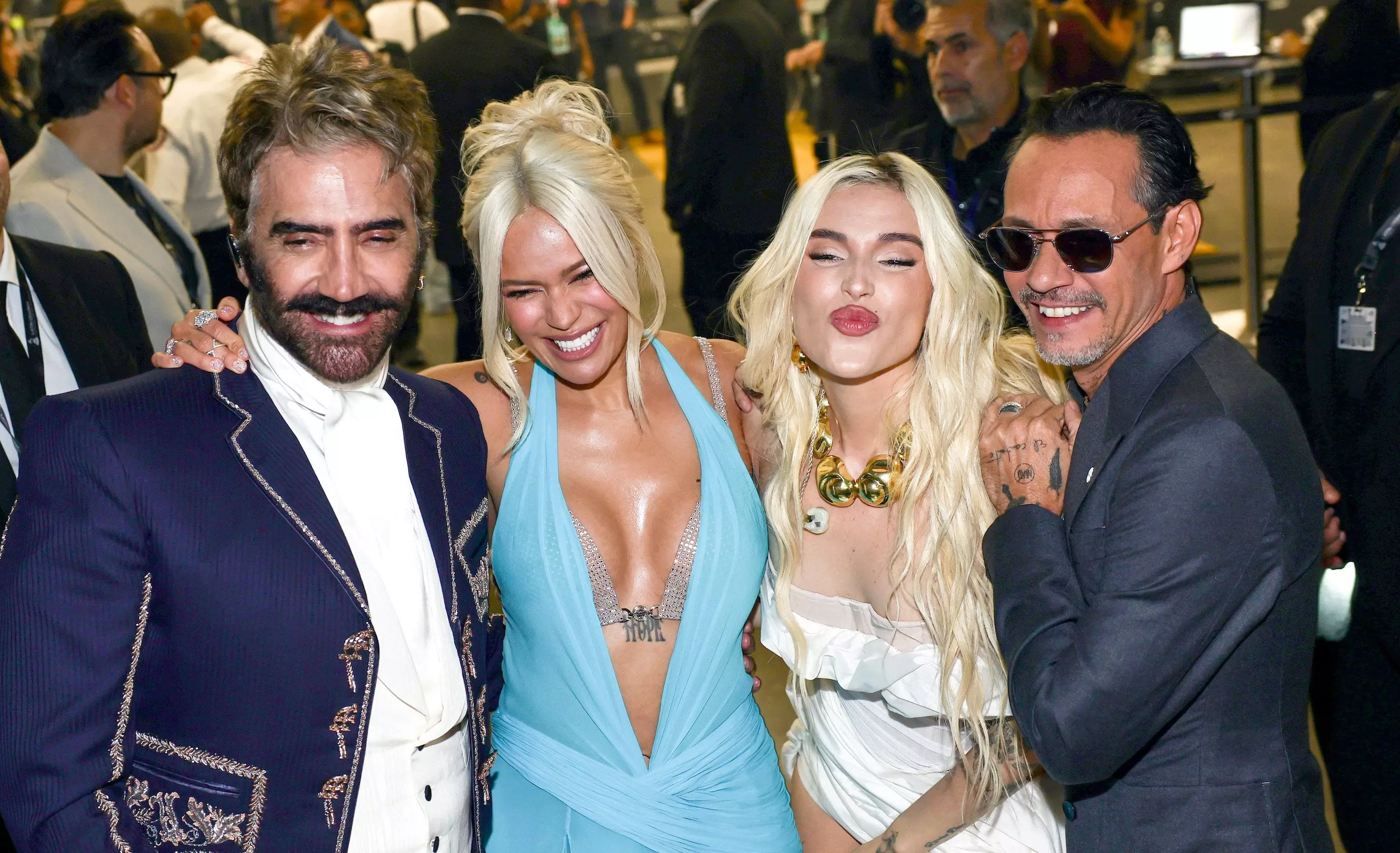
10 Meaningful Moments From The 2024 Latin GRAMMYs: Karol G's Heartfelt Speech, Tributes To Late Legends & More
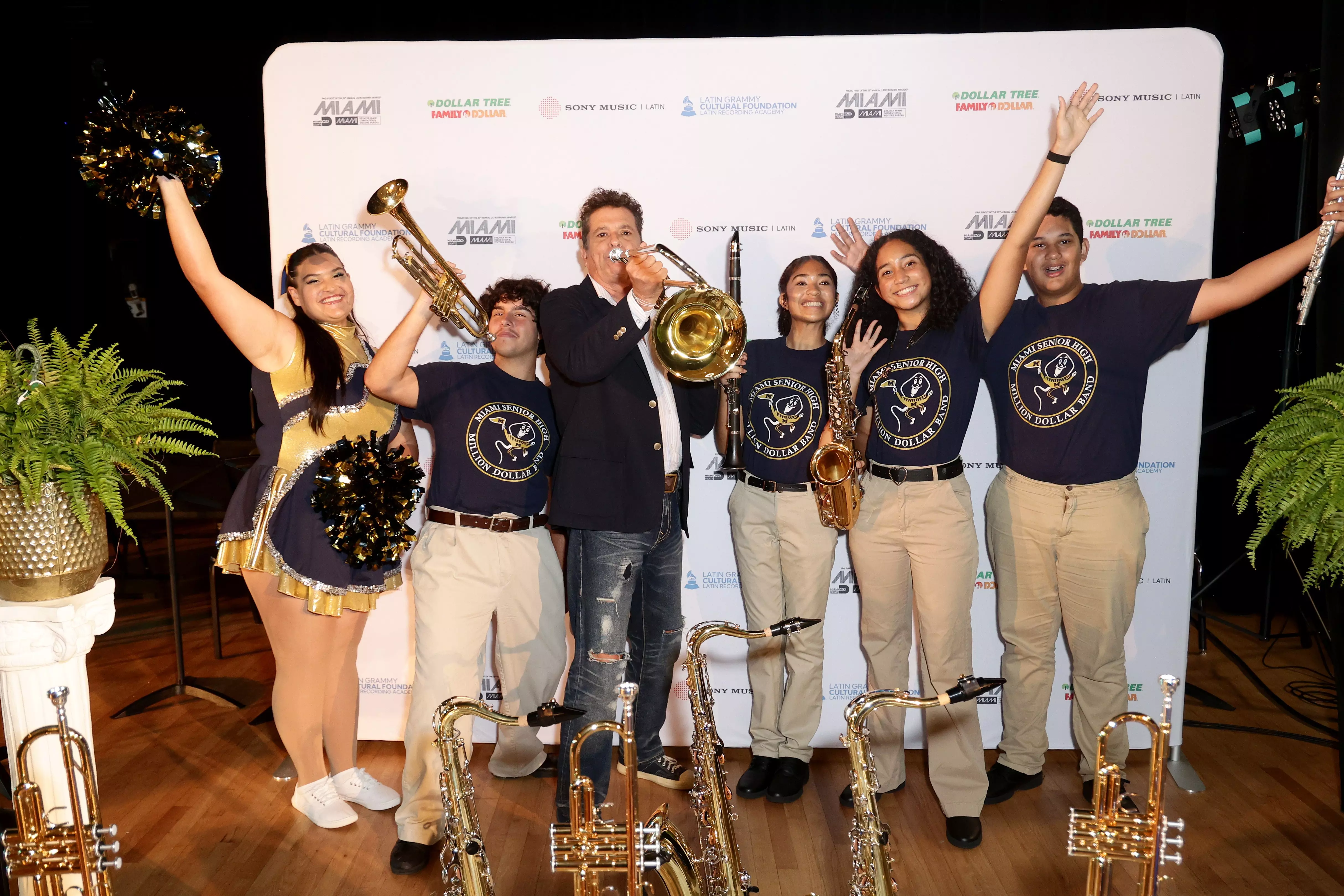
Behind The Scenes At Latin GRAMMY Week 2024: Inside VIP Celebrations & More
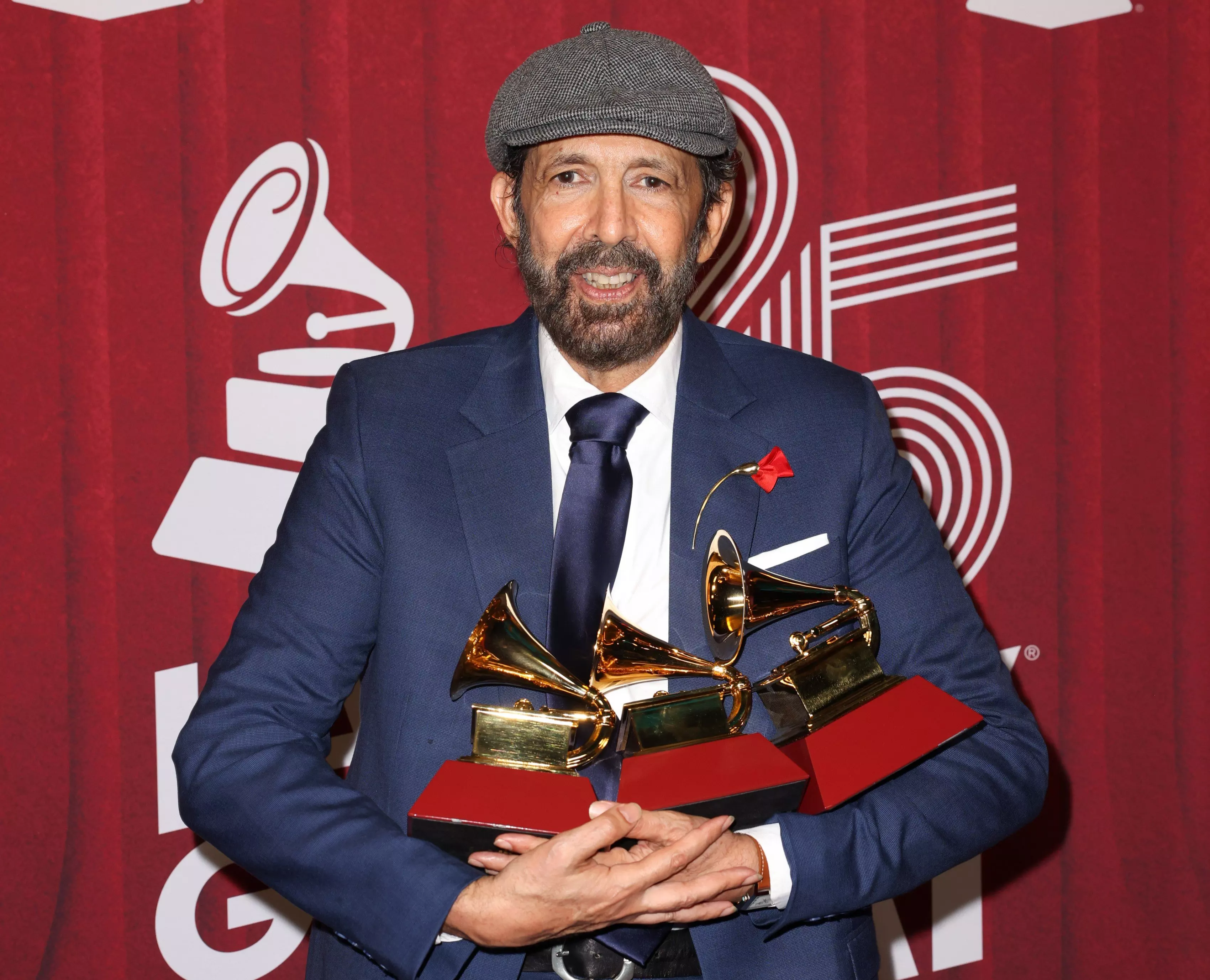
Juan Luis Guerra Sweeps The 2024 Latin GRAMMYs With 'Radio Güira'

Watch: Luis Fonsi Performs "Despacito" & Two More Of His Classics At The 2024 Latin GRAMMYs

Watch: Juan Luis Guerra 4.40 Wins Album Of The Year For 'Radio Güira' | 2024 Latin GRAMMYs
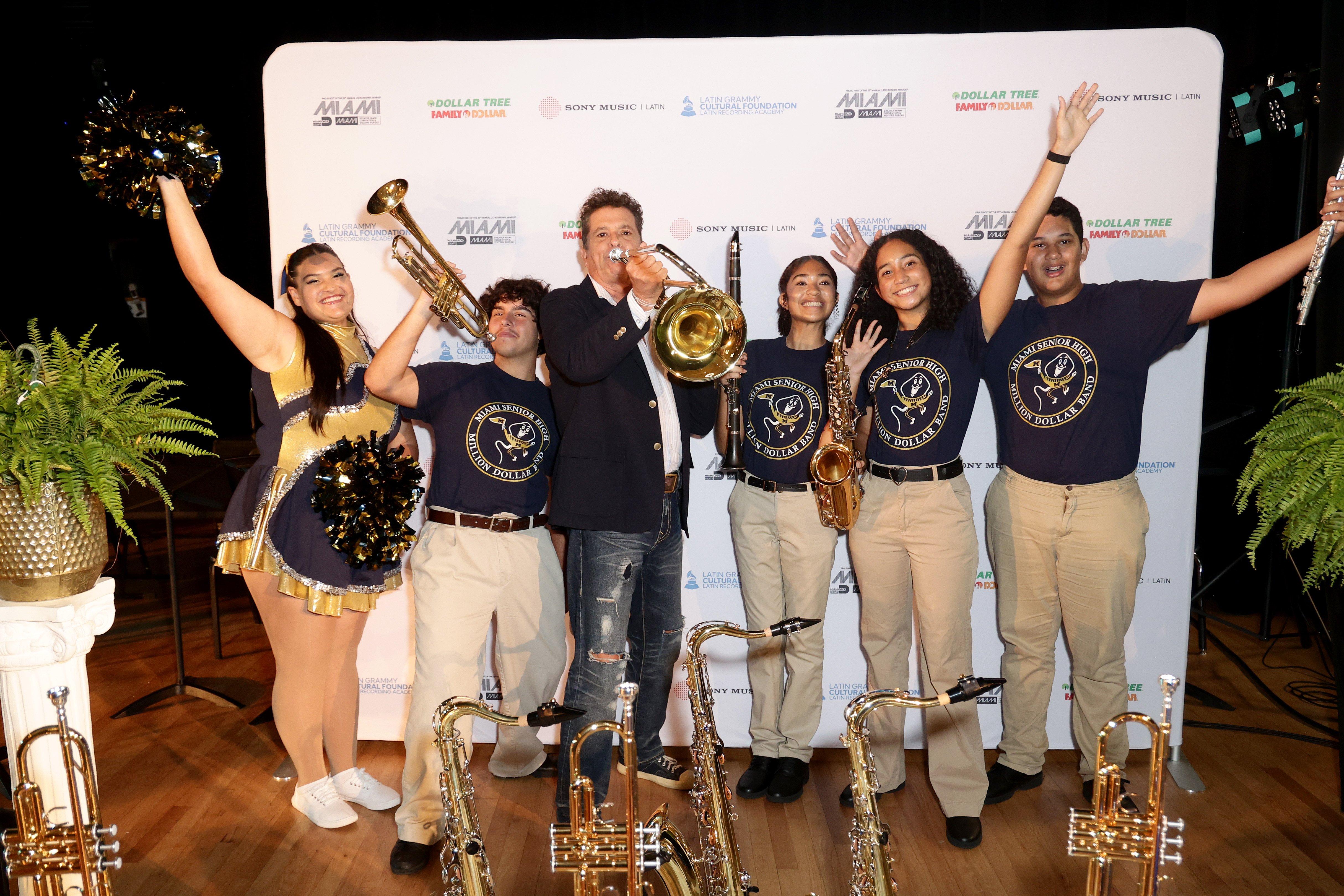
Photo: John Parra/Getty Images for The Latin Recording Academy
list
Behind The Scenes At Latin GRAMMY Week 2024: Inside VIP Celebrations & More
The Latin Music community has been celebrating with a full week of festivities leading up to the 2024 Latin GRAMMYs in Miami, Florida. Here are some behind-the-scenes moments from the biggest week in Latin Music.
The Latin music community is buzzing with excitement following a week of events leading up to the 25th Annual Latin GRAMMY Awards. Held at Miami's Kaseya Center on Nov. 14, the 2024 GRAMMYs showcased the best and the brightest in global Latin sounds.
In the lead-up to The Biggest Night In Latin Music, a series of festivities offered a rare glimpse into the heart of Latin music’s vibrant culture. Latin GRAMMY Week brought artists, producers, and fans together on star-studded red carpets and intimate industry events — each of which was electric with anticipation, celebration, and reflection.
Read more: 2024 Latin GRAMMYs: See The Full Winners & Nominations List
Continue celebrating 25 years of Latin Music excellence with a glimpse behind the scenes at some of the unforgettable moments that have made this week in Miami one to remember.
Leading Ladies Got Their Flowers
One of the first events of Latin GRAMMY week was the 8th edition of the Leading Ladies in Entertainment, a heartfelt celebration of women who have made significant contributions to the arts and entertainment world.
The event was hosted by Latin GRAMMY-nominated artist Becky G (who also performed at the 2024 Latin GRAMMYs) and was held inside inside the Loews Hotel. Portraits of honorees Ana Rosa Santiago, Vivir Quintana, Julieta Venegas and Diana Rodríguez were displayed on elegant arches draped in peach and gold. A warmth and intensity buzzed throughout the room, which was amplified by Becky G's encouragement.
Each honoree's speech reflected the event's theme of elevating women and inspiring the next generation of female leaders. Quintana's powerful speech shared sage wisdom with aspiring music professionals in the room. “You absolutely do not have to change anything about yourself. Just work on your talent, be who you are, and follow your inner compass always,” she told the crowd, sparking a standing ovation.
In a sweet touch to the already outstanding celebration, attendees were invited to create personalized bouquets. The gesture left honorees and guests alike feeling empowered and appreciated, with the evening both symbolically and quite literally giving everyone their flowers for their contributions to Latin music and culture.
Nominees "Swam" With The Big Fish
The Latin GRAMMY Awards do more than recognize artistic excellence — they invite nominees into a circle of industry peers who celebrate each other's achievements. At the Latin GRAMMY Nominee Reception, this vibrant community bonded over a deep appreciation for the artistry, dedication, and hard work it takes to earn this peer-voted honor.
The crowd at the Frost Science Museum’s Ocean Gallery was a mix of first-time Latin GRAMMY nominees such as Latin Mafia and Carlos Rivera, international stars such as Alok, and recently-announced nominees for the 2025 GRAMMYs. Producers and collaborators who work with J Noa, Peso Pluma, Residente, Anitta and Kali Uchis were also in attendance. Guests represented a range of genres and disciplines: violinists, songwriters, DJs, salsa musicians, and even the singing clowns of Payasitas Nifu Nifa, who make children’s music, mingled energetically.
Nominees proudly donned their medallions, capturing this pivotal career moment on the red carpet and posing in front of a giant, golden GRAMMY. The reception featured a stunning aquarium view, and guests could watch the fish, sharks, and stingrays swimming peacefully above them and snapped more photos. The aquarium was a fitting scene: this year’s class of nominees certainly got here by making waves in the music industry.
The Future Sounded Bright As Rising Stars Hit The Stage
Held at Miami Beach’s Faena Forum and presented by Mastercard and Bank of America, the third annual Best New Artist Showcase brought an exciting spotlight to the future of Latin music. Over a performance-filled day, each of the seven Best New Artist nominees brought their unique flavor to the stage.
From Nicolle Horbath’s fresh popteño style to 13-year-old Kevin Aguilar’s heartfelt mariachi and corridos, every performance showcased a captivating fusion of genres. The crowd was especially energized when the three-piece girl group DARUMAS delivered an electrifying rock cover of Whitney Houston’s "I Wanna Dance with Somebody," getting everyone on their feet.
Other standout performances included Agris, Cacá Magalhães, Os Garotins, Íñigo Quintero, Sofi Saar, and Ela Taubert. Ultimately, it was Ela Taubert who took home the Latin GRAMMY on Thursday night, and she closed out the week with an emotional performance of her hit "¿Cómo Pasó?" alongside Joe Jonas at the 2024 Latin GRAMMYs.
This showcase not only highlighted the diverse talent shaping the future of Latin music but also gave attendees an unforgettable opportunity to experience the next generation of superstars up close.
Carlos Vives' Life & Influence Was Fêted
The annual Latin GRAMMY Person Of The Year Year celebration honored Colombian artist and philanthropist Carlos Vives. The annual event drew a crowd of about 2,000 attendees to the Miami Beach Convention Center, including legends in Latin music and the next generation of stars.
Guests arrived in ornate attire, enjoying drinks and capturing memories with the Glambot’s interactive photo experience. Among the star-studded crowd were Camilo, Grupo Frontera, Rico Love, Aymee Nuviola, AleMor, and many more. The mayor of Miami also took the stage to offer a few heartfelt words of appreciation for Vives’ contributions.
The evening culminated in a historic moment when six previous Latin GRAMMY Person Of The Year honorees gathered to pay tribute to Vives, a powerful salute to his legacy and impact on the Latin music community. Onstage at the 2024 Latin GRAMMYs, Carlos Vives was saluted by 2023 MusiCares Person Of The Year Jon Bon Jovi.
Somos Familia
In collaboration with the Recording Academy’s Florida Chapter,BMI and Rebeleon Entertainment, Latin music producers and artists gathered to celebrate in true Miami fashion — with a party.
At the Los Producers event, attendees filled the venue’s balconies for the best views, while Latin GRAMMY nominees such as Cimafunk, Agris, Latin Mafia, and Trooko were spotted among the crowd. Guests danced and mingled to a mix of '80s classics and rock, all delivered in a Spanglish blend that had the crowd singing along. But the night truly came alive during a series of energetic performances from the likes of five-time Latin GRAMMY winner Luis Fonsi, The Warning, and Bruses.
Prior to taking the stage, Fonsi and his bandmates shared a sweet moment. The group sang "Happy Birthday" and brought out a cake for their guitarist, exemplifying the tight-knit family bond that defines the Latin music community.
GRAMMY U Gained On The Ground Experience
Throughout the week, over 75 GRAMMY U members volunteered on the talent team escorting artists such as Gloria Estefan and DARUMAS.
Florida Chapter Member Amy Torres shared her experience: "My dream has always been to work in the Latin music industry so this is a dream come true. This week, I’ve seen a lot of artists I’ve admired growing up and made connections both within GRAMMY U and outside of the organization."
Patience Murray, a non-student GRAMMY U Member and singer/songwriter based in Florida, described GRAMMY Week as a "mind-blowing experience." "Being able to witness a music event of this caliber and magnitude felt like a once-in-a-lifetime manifestation exercise, and I'm grateful to have seen the stages I dream to one day perform on," she said, adding that her favorite part of the week was connecting with other GRAMMY U members.
"I have gained so much respect for the talent teams who work tirelessly behind the scenes to ensure that every show looks effortless and enjoyable for the fans," Murray added.
2024 Latin GRAMMY Week was the definitive celebration of music's power to connect and inspire. As Latin music cements its place on the global stage, it’s clear that these artists are not only shaping the future of the industry but also fostering a greater sense of shared identity that transcends borders.
Latest Latin Recording Academy News & Initiatives

10 Meaningful Moments From The 2024 Latin GRAMMYs: Karol G's Heartfelt Speech, Tributes To Late Legends & More

Behind The Scenes At Latin GRAMMY Week 2024: Inside VIP Celebrations & More

Juan Luis Guerra Sweeps The 2024 Latin GRAMMYs With 'Radio Güira'

Watch: Luis Fonsi Performs "Despacito" & Two More Of His Classics At The 2024 Latin GRAMMYs

Watch: Juan Luis Guerra 4.40 Wins Album Of The Year For 'Radio Güira' | 2024 Latin GRAMMYs
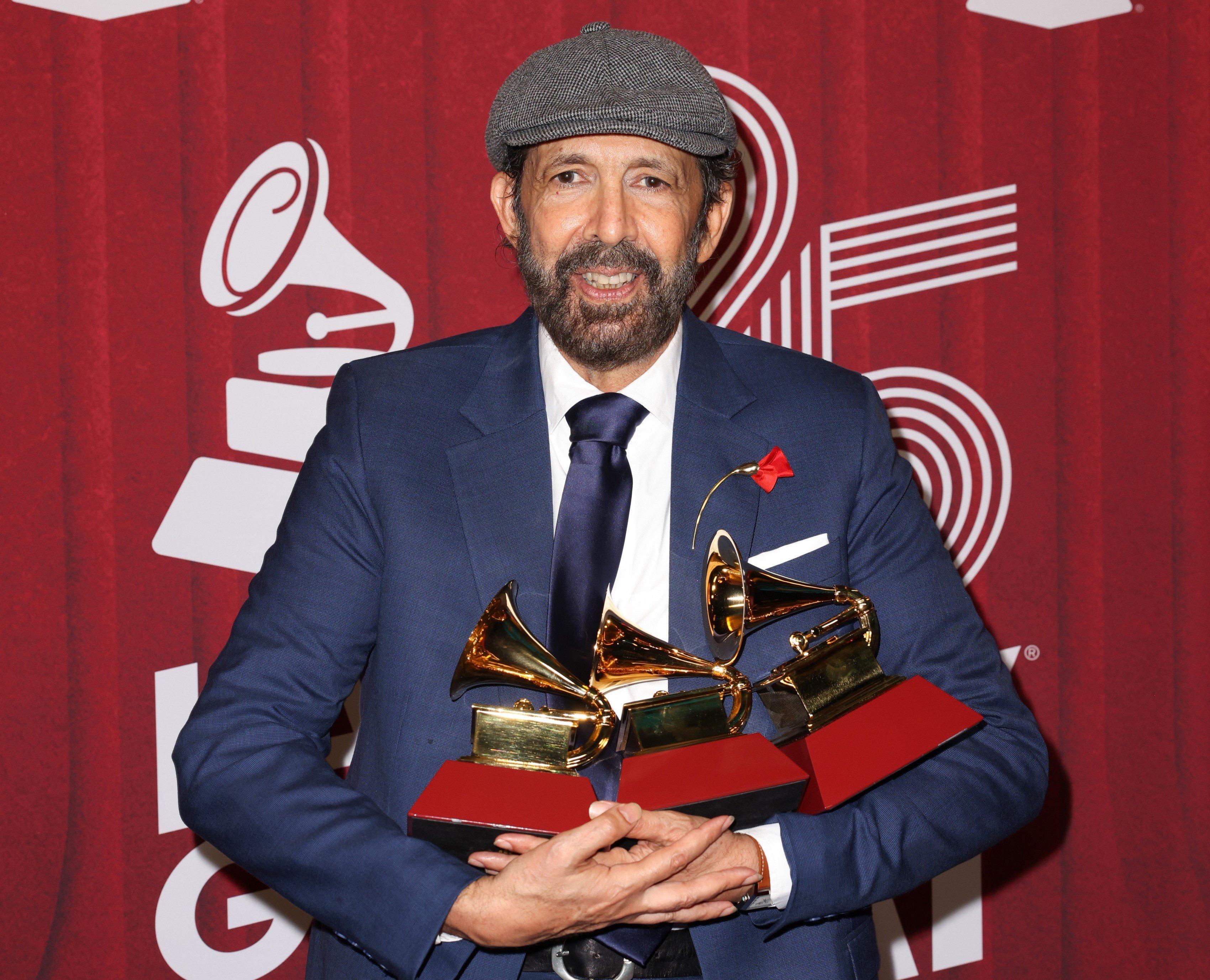
Photo: Alexander Tamargo/Getty Images for The Latin Recording Academy
list
Juan Luis Guerra Sweeps The 2024 Latin GRAMMYs With 'Radio Güira'
The legendary Dominican artist won Album Of The Year for a fifth time with his 2023 EP.
The 2024 Latin GRAMMYs marked 25 years of Latin music excellence with a gala evening in Miami, one of the world capitals for the Latin music industry. Replete with dazzling performances from legends and rising acts, tributes and tearful acceptance speeches, the 25th Annual Latin GRAMMYs was certainly one for the books.
In an evening with many leading lights, onelegend stood out as the night’s star: singer, songwriter and musician Juan Luis Guerra.
Guerra already had two dozen Latin GRAMMYs on his CV — as well as three GRAMMYs — but his run at this year’s Latin GRAMMYs netted several new pieces of hardware. His honors included the award Album Of The Year for Radio Güira, the inventive 2023 concept EP released with his band 4.40, and Record Of The Year for "Mambo 23," a hyper-speed merengue epic from the EP. Radio Güira also took the prize for Best Merengue/Bachata Album, while "Mambo 23" also won for Best Tropical Song.
These were Guerra's first wins in a major category since 2015, when he won Album Of The Year for Todo Tiene Su Hora at the 16th Annual Latin GRAMMY awards. Guerra has won Album Of The Year as an artist in 2007, 2010 and 2014, and in 2012 he won for his production work on Juanes' MTV Unplugged album.
Despite his familiarity with the Latin GRAMMYs stage, Guerra appeared emotional when he walked up to the stage for the last time to accept the award for Album Of The Year from Carlos Vives. Holding his Latin GRAMMY, Guerra praised God and credited Jesus with inspiring the album.
Earlier in the night, Guerra delighted the crowd at Miami’s Kaseya Center with a performance of "Mambo 23," featuring the full band. Dressed in his iconic newsboy cap and neckerchief, he launched into the dance floor burner on a stage illuminated in flashing neon. Boiler Suit-clad dancers completed a scene that was somehow both unassuming and spectacular.
Guerra has had a four-decade long career of innovating in Caribbean music, while bringing genres such bachata to international fame. Radio Güira continues the theme of boundary pushing. It has been praised for its experiments in combining old and new genres, from merengue to reggaeton, with dashes of jazz and blues.
Check out the complete list of winners and nominees at the 2024 Latin GRAMMYs.
Latest Recording Academy News & Initiatives
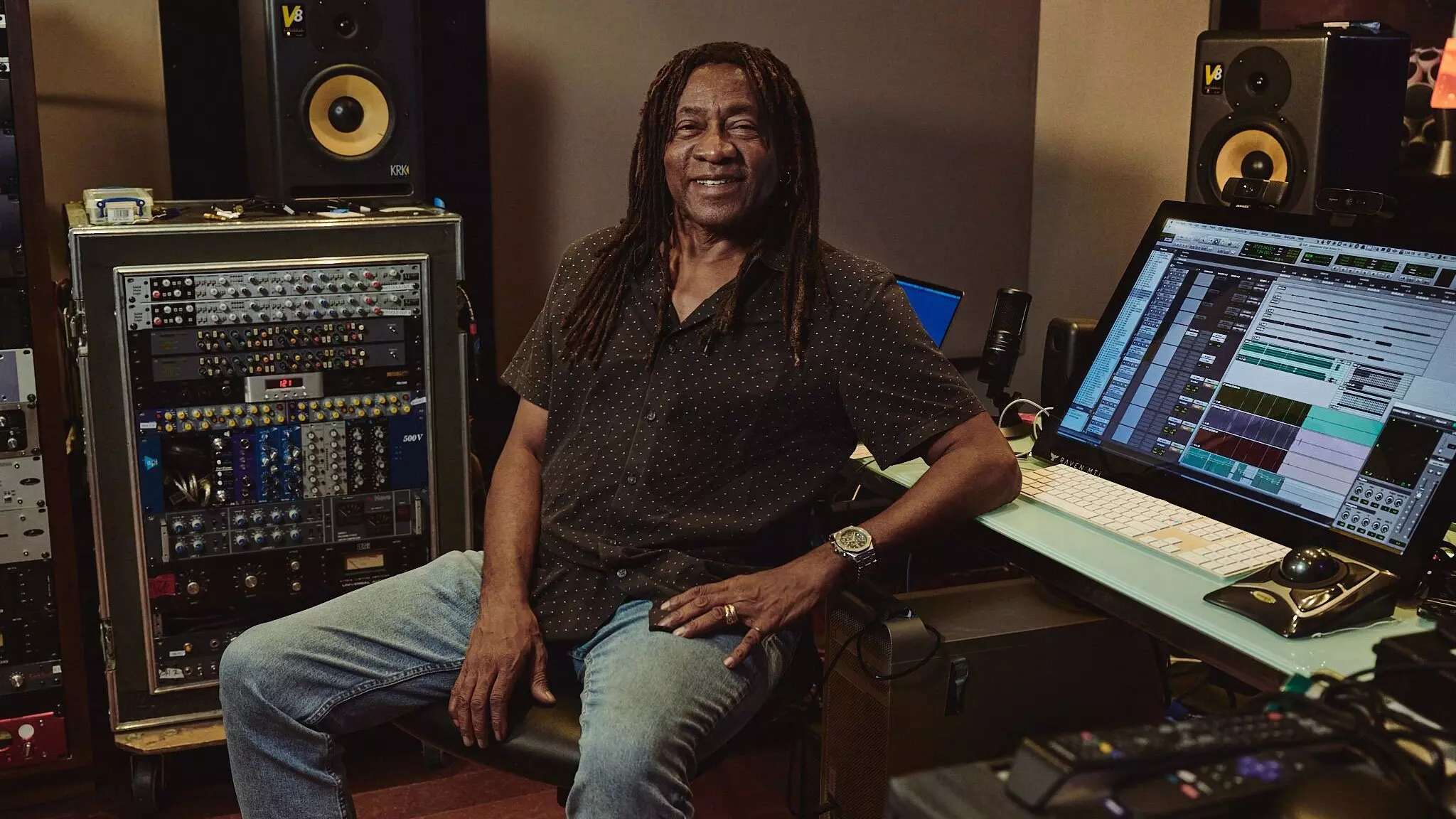
The Recording Academy Producers & Engineers Wing To Honor Jimmy Douglass During 2025 GRAMMY Week Celebration

10 Meaningful Moments From The 2024 Latin GRAMMYs: Karol G's Heartfelt Speech, Tributes To Late Legends & More

Behind The Scenes At Latin GRAMMY Week 2024: Inside VIP Celebrations & More
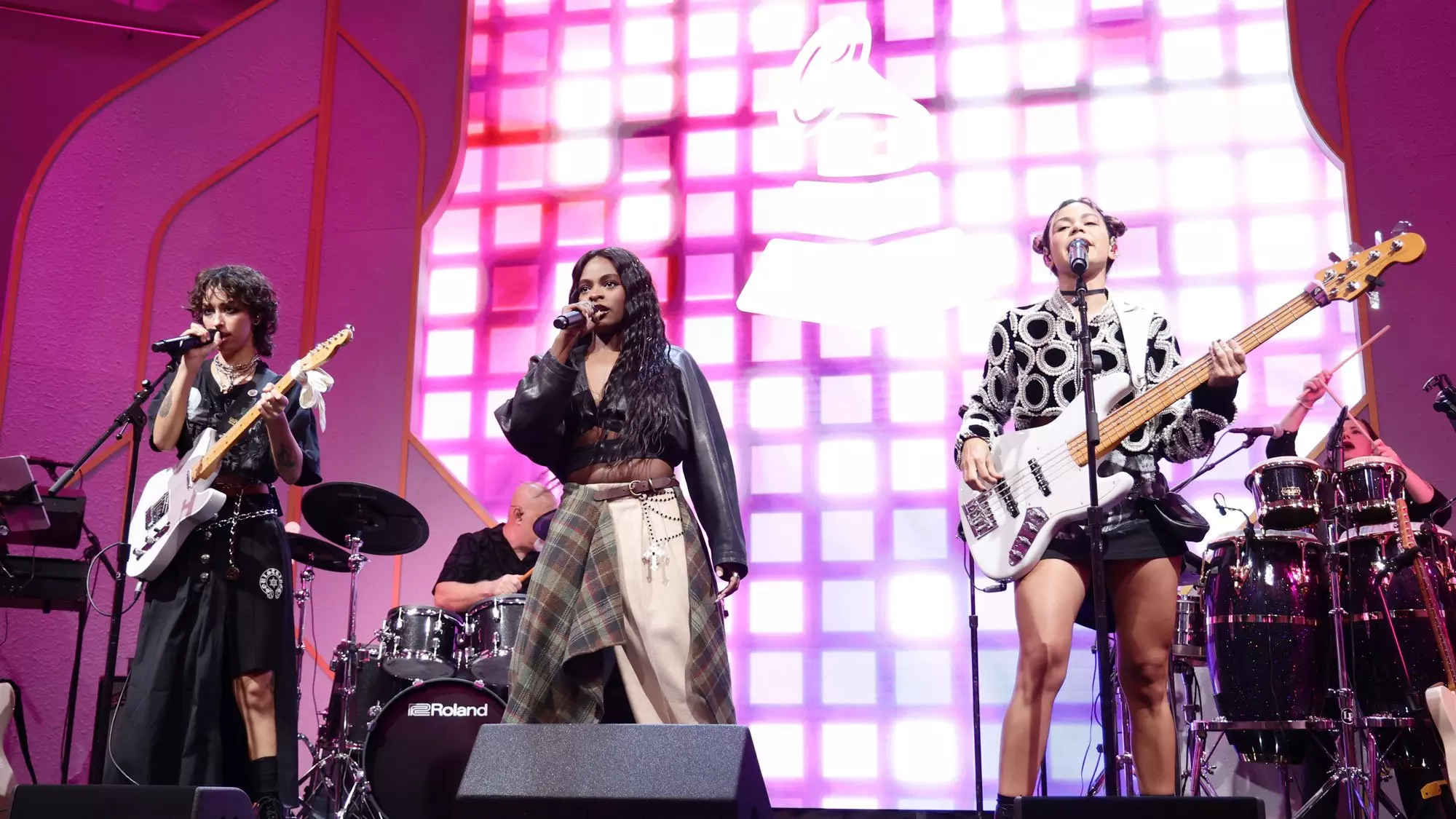
Agris, DARUMAS, Ela Taubert, Kevin Aguilar & More Perform At The 2024 Latin GRAMMYs Best New Artist Showcase

Amazon Music & Black Music Collective Announce Fourth Annual 'Your Future Is Now' Scholarship Program For HBCU Students

Photo: Jason Koerner/Getty Images
news
Watch: Luis Fonsi Performs "Despacito" & Two More Of His Classics At The 2024 Latin GRAMMYs
Just after winning his sixth Latin GRAMMY, the Puerto Rican star celebrated his win — and career — with a feel-good performance of "No Me Doy Por Vencido," "Despacito" and "Santa Marta."
The legacy of Luis Fonsi's career practically goes hand-in-hand with the history of the Latin GRAMMY Awards. Fresh off his win for Best Pop Vocal Album at the 2024 Latin GRAMMYs, the Puerto Rican pop icon performed a medley of his greatest hits.
The career-spanning performance began with his beloved 2008 ballad, "No Me Doy Por Vencido." In a sparkling orange suit, Fonsi belted his heart out to the song that's become an anthem of hope.
Dancers then joined him onstage for a sultry performance of his 2017 global smash, "Despacito," which had the whole audience — including Marc Anthony and his wife Nadia Ferreira — dancing along. Fonsi then closed out his live medley with the upbeat "Santa Marta" from his latest album, El Viaje; he danced into the audience where this year's Person Of The Year honoree, Carlos Vives, sang along with him.
The ambitious El Viaje, which was recorded in several different countries around the world, earned Fonsi a Latin GRAMMY win for Best Pop Vocal Album. It marks his 11th Latin GRAMMY nomination to date; he has won six Latin GRAMMYs, four of those thanks to "Despacito," which won Record Of The Year and Song Of The Year in 2017.
"What I'm most proud of is just that — it's a song that represents my heritage, my language, and the love of my island, Puerto Rico," Fonsi told GRAMMY.com about "Despacito" back in 2022. "It has that swag, that thing, that sabor that we carry in our blood. It's a celebration of all of that."
Just after the 2024 Latin GRAMMYs, Fonsi will add an exciting first to his resume: his film debut. The singer will star in the rom-com Say A Little Prayer, which opens in theaters on Nov. 22.
Check out the complete list of winners and nominees at the 2024 Latin GRAMMYs.
Latest In Latin Music, News & Videos

10 Meaningful Moments From The 2024 Latin GRAMMYs: Karol G's Heartfelt Speech, Tributes To Late Legends & More

Behind The Scenes At Latin GRAMMY Week 2024: Inside VIP Celebrations & More

Juan Luis Guerra Sweeps The 2024 Latin GRAMMYs With 'Radio Güira'

Watch: Luis Fonsi Performs "Despacito" & Two More Of His Classics At The 2024 Latin GRAMMYs

Watch: Juan Luis Guerra 4.40 Wins Album Of The Year For 'Radio Güira' | 2024 Latin GRAMMYs
